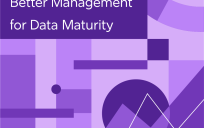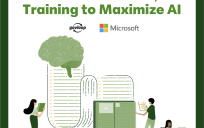The opening of government data — one of President Barack Obama’s key technology initiatives in his second term in office — has unleashed a world of capabilities for private companies and citizens, nonprofits, and other nongovernmental organizations to build on the invaluable and enormous troves of information that only the American government, at its scale, can collect.
Open data and big data are more than some of the tech world’s latest buzzwords, as online MBA program MBA@UNC notes in its latest blog on transforming big data from a buzzword to a meaningful skill. Federal agencies like the Census Bureau, the Department of Health and Human Services and the Department of Transportation amass data sets on an expansive variety of topics, which they then publish to the federal government’s open data repository, Data.gov. And amid the current revolution in big data, it’s become apparent just how powerful opening this data can be to the nation.
Aside from the obvious benefits in transparency that opening this amount of data brings to the public sector, it also provides countless opportunities for third-party organizations and innovative thinkers to use it in ways the government may have never thought of or originally intended.
Take for example a public service website and forum called City-Data. While it could exist on its own without the opening of government data, it certainly wouldn’t fulfill its mission of providing detailed profiles of all U.S. cities — including demographics, crime rates, weather, home value, cost of living and more — at the granular level it does without it.
City-Data leverages at least 11 different data sets from federal agencies, such as those from the National Weather Service, the Bureau of Labor Statistics, the IRS, the Census Bureau and more.
Some of the nation’s most profitable and innovative companies also benefit from the vast government data now at their fingertips. LinkedIn uses data from the departments of Labor and Education. Zillow helps you find a new home with Census Bureau and Bureau of Labor Statistics information. Kayak pulls from the Federal Aviation Administration to assist with all of your travel needs.
The opening of this data has been further empowered by the arrival of more and more data flowing and collecting around the world as internet-connected, data-generating devices like FitBits, smart cars and smartphones are becoming more prevalent in the emerging Internet of Things paradigm – that is, a world where seemingly everything has an internet connection.
Meanwhile, that’s made the ability to parse through these enormous data sets, or build and use tools to do so, an invaluable skill in every sector.
Take these stats for a whirl if you’re not convinced: More data has been created in the past two or three years than in all of human history prior. By the year 2020, every human being on the planet will on average generate about 1.7 megabytes — about the size of a two-minute-long, average-quality MP3 audio file — of new information every second. At that point, it’s estimated there will be 44 zettabytes of data on Earth, which equates to 44 trillion gigabytes — a tenfold increase in just seven years.
Just as it became apparent for organizations during the emergence of the internet era that they could not survive without an IT team to support the growing importance of technology to their missions, there is a sector-agnostic surge in the realization that there are countless benefits to harnessing this incoming wave of big data. Data scientists are becoming an essential member of the national workforce.
With the oncoming big data revolution, the need for data scientists and analysts is at an all-time high. The field is a nascent one, but many early statistics on jobs in data show the workforce making more than six figures just a few years into their careers. And with an explosive demand for data nerds, it’s likely there will be a shortage of talent to fill vacancies. By 2018, the U.S. could face a shortage of as many as 190,000 people needed to fill data-focused positions.
Whether embarking in a full-time education to take the forthcoming tsunami of data for a ride or just looking for a course to supplement and prepare their existing skills for a world where big data reigns supreme, many people are looking to increase their fluency in data-speak and understand what it will mean for their lives ahead.
Ready or not, the big data revolution is upon us. And as more government agencies open data and other organizations generate it otherwise through the influx of connected devices, data will play a role in everything we do.
Just look up to the sky at nighttime. See those billions upon trillions of stars, so many it’s impossible to count. By 2020, there will be more bits of data on Earth than stars in the sky.





Leave a Reply
You must be logged in to post a comment.